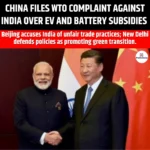Phone Tapping Laws in India
|
General Studies Paper II: Government Policies & Interventions, Transparency & Accountability, Fundamental Rights |
Why in News Phone Tapping Laws in India?
Recently two High Courts delivered opposite rulings on the government’s power to tap phones for crime prevention. The Delhi High Court upheld it as lawful in public interest while the Madras High Court raised concerns over privacy violations.
- The Delhi High Court, in its ruling, emphasized that lawful interception of phone calls by government agencies is valid under certain conditions.
- The Madras High Court stated that tapping phones without judicial oversight may violate the fundamental right to privacy under Article 21 of the Constitution.
Phone Tapping and Its Significance
- What is Phone Tapping?
-
-
- Phone tapping refers to the act of secretly listening to or recording conversations made over a telephone network.
- In India, this is only allowed by authorized government agencies.
- It is primarily used for intelligence gathering and crime prevention. Authorities generally use it to track terrorism, organized crime, and threats to public order.
- While it serves a security purpose, it also enters a sensitive zone when it comes to personal liberty and privacy.
-
- Significance
-
- National Security: Helps in tracking terror threats, espionage, and external dangers.
- Crime Prevention: Assists in detecting organized crime, trafficking, and corruption.
- Public Safety: Alerts authorities about potential riots or threats to public order.
- Intelligence Gathering: Supports ongoing investigations and surveillance operations.
- Evidence Collection: Provides crucial evidence in legal proceedings and trials.
- Policy Enforcement: Aids enforcement of cyber laws and financial regulations.
- Crisis Response: Offers early warning signals during emergencies or unrest.
Legal Framework Governing Phone Tapping in India
- Indian Telegraph Act, 1885: The Indian Telegraph Act, passed in 1885, serves as the main law that allows the government to intercept telecommunication. Under Section 5(2) of this Act, both the Central and State governments can authorize the interception of messages.
- However, this is permitted only during a public emergency or when public safety is at risk.
-
-
- The law requires that any such order must be passed in the interest of sovereignty, security, public order, or to prevent incitement of an offense.
-
- Information Technology Act, 2000: As digital communication expanded, the Information Technology Act, 2000 included new provisions for monitoring electronic data. Section 69 of the Act empowers the Central Government and certain state authorities to intercept, monitor, or decrypt any information generated, transmitted, or stored in any computer resource.
-
-
- However, this is allowed only for specified reasons such as national security, public order, or preventing crimes.
-
- Who Can Authorize Tapping: The Ministry of Home Affairs, along with state home departments, can approve interception when deemed necessary. Only senior officials can grant permission for interception.
-
- At the central level, the Union Home Secretary is the authority to approve any request for phone tapping.
- For state-level interceptions, the approval must come from the Home Secretary of the concerned State Government.
- To ensure checks and balances, a Review Committee at both the central and state levels examines every order.
Supreme Court Guidelines and Landmark Judgments on Phone Tapping
- 1997 PUCL vs. Union of India: In 1997, the Supreme Court delivered a landmark verdict in the case of People’s Union for Civil Liberties (PUCL) vs. Union of India.
- This case challenged the unrestricted powers given to the government under Section 5(2) of the Indian Telegraph Act, 1885.
- The Court observed that intercepting private communication impacts the right to privacy, which is part of the fundamental rights under Article 21 of the Constitution.
-
-
- It strictly barred lower-ranking officials, such as Joint Secretaries, from authorizing phone tapping.
-
- 2017 Justice K.S. Puttaswamy vs. Union of India: In 2017, the Supreme Court delivered another historic ruling in Justice K.S. Puttaswamy vs. Union of India case.
-
-
- The Court unanimously declared that the right to privacy is a fundamental right under Article 21.
- This decision had a major impact on surveillance practices, including phone tapping.
- The judgment emphasized that any action that invades privacy must meet three tests — it should be backed by law, must serve a legitimate aim, and should be proportionate in nature.
-
- Safeguards Guidelines:
-
- Every interception order must be recorded in writing with valid reasons.
- The duration of each order should not exceed two months, though it can be extended up to six months with proper justification.
- A Review Committee must be formed at both the Central and State levels to examine the necessity and legality of every order.
- Agencies must store records securely and destroy them once the objective is achieved.
Concerns over Privacy, Oversight, and Misuse
- Weak Oversight Mechanisms: According to the 1997 PUCL ruling, only the Union or State Home Secretary can legally authorize interception. Yet, the process lacks independent review before surveillance begins. Though review committees exist at both central and state levels, they often function within the same executive structure. This weakens the impartiality of their decisions.
- Political Misuse: Allegations of opposition leaders, journalists, and activists being targeted have deepened public mistrust. While governments justify interception in the name of national interest, records rarely show credible threats behind the tapped communications. In 2021, multiple reports claimed that spyware tools were used against civil society members.
- Lack of Transparency: The current system does not mandate authorities to inform citizens whose phones have been tapped unless directed by courts. This secrecy may be necessary in some cases, but total absence of transparency creates an environment of unchecked control. Even the number of phone tapping orders issued annually is not shared openly with the public.
Way Forward for Regulating Phone Tapping
- Independent Review Authorities: India must consider forming independent review bodies staffed with retired judges, legal experts, and civil society members. These panels can examine interception requests before and after execution to ensure compliance with legal and ethical norms.
- Judicial Authorization: To prevent arbitrary decisions, India should introduce a system where judicial oversight becomes mandatory before intercepting private communication. A designated judicial officer should evaluate whether the request meets the legal test of necessity and proportionality.
- Update Legal Safeguards: The rise of encrypted communication and internet-based platforms has rendered parts of the law outdated. India needs a modern legislative framework that addresses new technologies while maintaining individual freedoms. The government should clearly define the terms, scope, and limits of digital surveillance in a fresh legal code.
- Public Accountability: Publishing anonymized annual reports on interception orders can improve transparency. Citizens should be allowed to challenge illegal surveillance through an accessible legal route. Informing individuals post-surveillance, wherever national security is not compromised, would promote trust.









